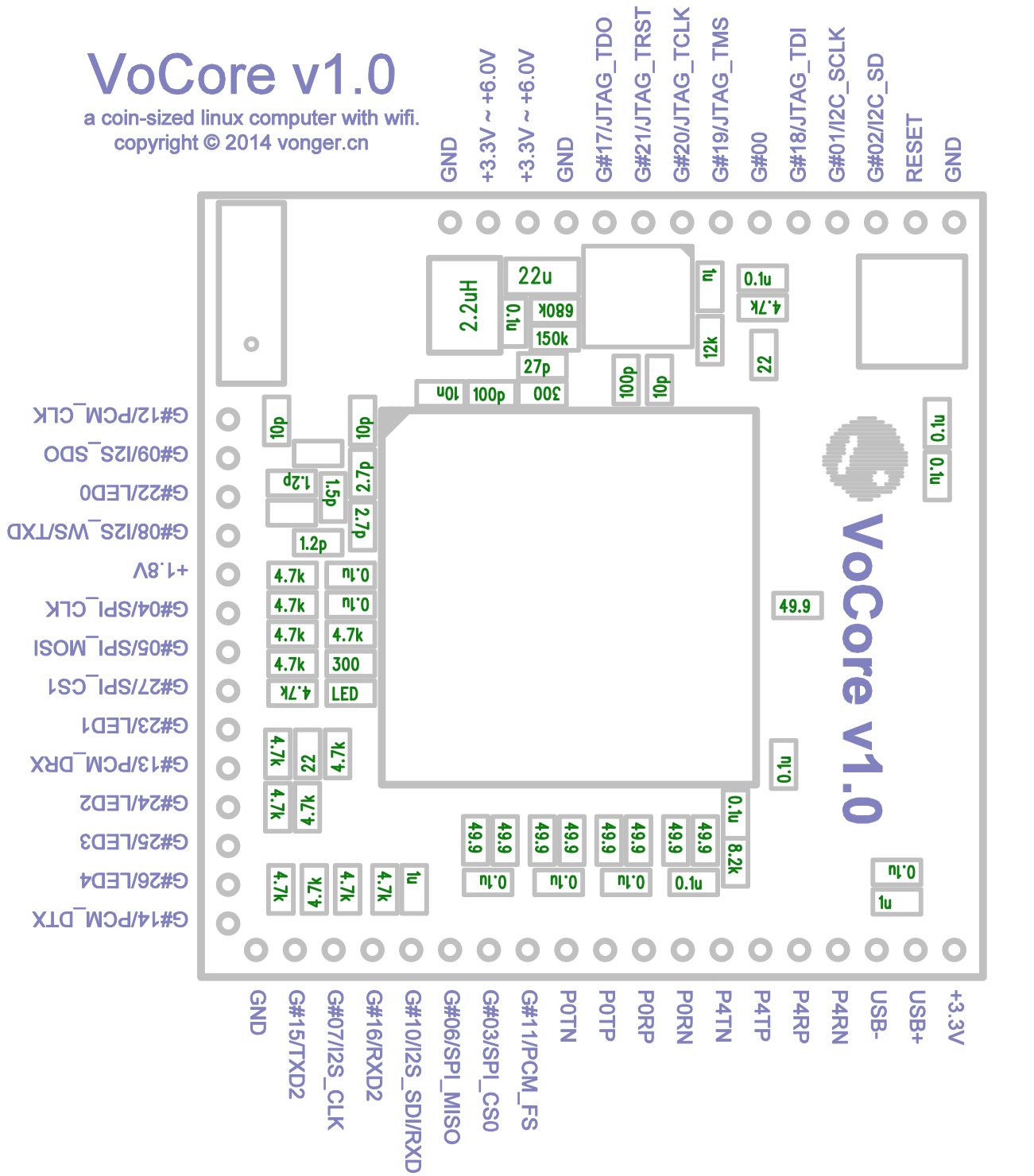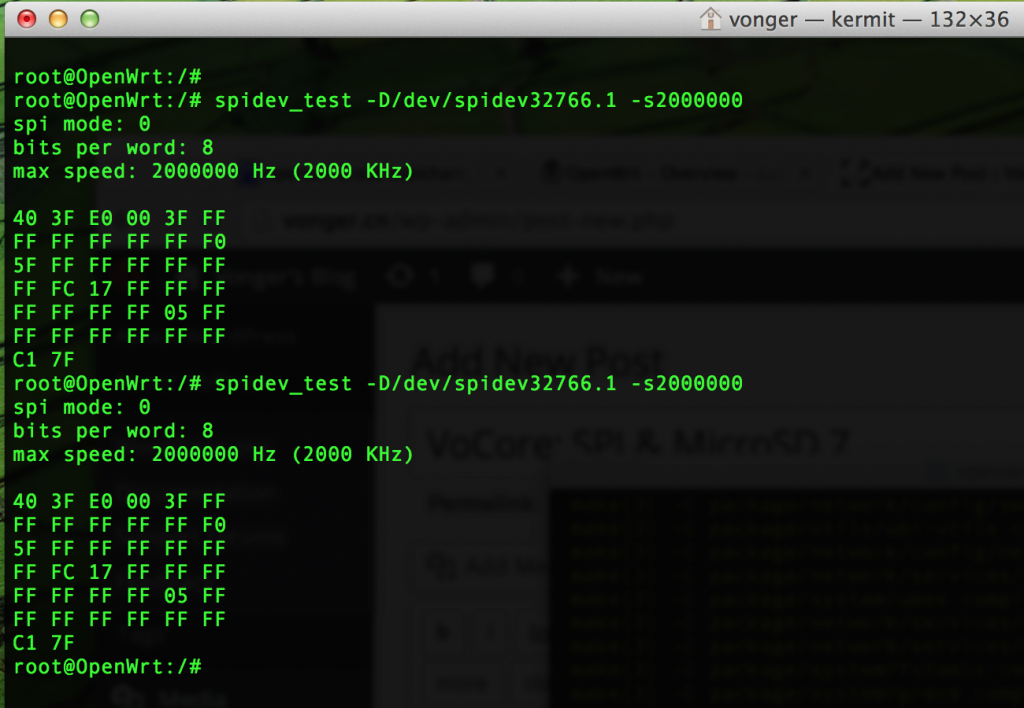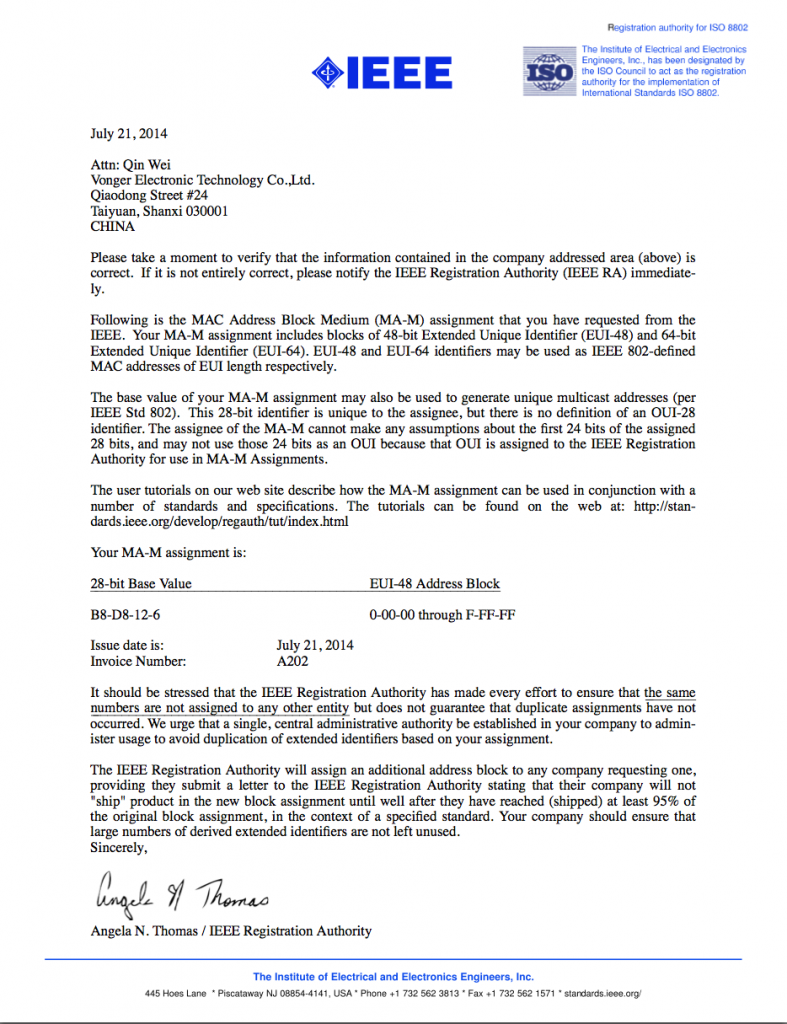Category Archives: VoCore
VoCore: SPI & MicroSD 8
Yesterday, just get some result from MISO but I do not know whether or not it is right result, or at least it is not random result caused by the noise.
Today, I still not sure whether or not it is right mmc driver request result, but I am sure it is not a random result.
I just test it in this way:
spidev_test -D/dev/spidev32766.1 -s4000000
spidev_test -D/dev/spidev32766.1 -s8000000
spidev_test -D/dev/spidev32766.1 -s16000000
spidev_test -D/dev/spidev32766.1 -s32000000
spidev_test -D/dev/spidev32766.1 -s64000000
4MHz ~ 32MHz are same result. 64MHz is not same as them.
root@OpenWrt:/# spidev_test -D/dev/spidev32766.1 -s32000000 spi mode: 0 bits per word: 8 max speed: 32000000 Hz (32000 KHz) 40 3F E0 00 3F FF FF FF FF FF FF F0 5F FF FF FF FF FF FF FC 17 FF FF FF FF FF FF FF 05 FF FF FF FF FF FF FF C1 7F root@OpenWrt:/# spidev_test -D/dev/spidev32766.1 -s64000000 spi mode: 0 bits per word: 8 max speed: 60000000 Hz (60000 KHz) 20 1F F0 00 1F FF FF FF FF FF FF F8 2F FF FF FF FF FF FF FE 0B FF FF FF FF FF FF FF 82 FF FF FF FF FF FF FF E0 BF
I do not know a byte of the result, but I am sure the result is not random noise.
So I guess the TF card support up to 30MHz, it is 1/4 of system timer who is 120MHz.
The result has so many 0xFF, that might be an error result due to R3(MISO) is pulled to VCC.
So I change the hardware a little, switch R3 from pulling to VCC to pulling to GND. If the result has many 0x00 replace that 0xFF, the hardware must not right and the result is not really from TF card.
root@OpenWrt:/# spidev_test -D/dev/spidev32766.1 -s32000000 spi mode: 0 bits per word: 8 max speed: 32000000 Hz (32000 KHz) 00 00 00 00 00 00 00 00 00 00 00 00 00 00 00 00 00 00 00 00 00 00 00 00 00 00 00 00 00 00 00 00 00 00 00 00 00 00 root@OpenWrt:/# spidev_test -D/dev/spidev32766.1 -s32000000 spi mode: 0 bits per word: 8 max speed: 32000000 Hz (32000 KHz) 40 3F E0 00 3F FF FF FF FF FF FF F0 5F FF FF FF FF FF FF FC 17 FF FF FF FF FF FF FF 05 FF FF FF FF FF FF FF C1 7F root@OpenWrt:/#
First result, the slot of TF card is empty.
Second result, plug TF card into slot. It is same result as we pull MISO to high. I am sure now, the data is from TF card.
So, the hardware is totally fixed, just need to find a way to make the mmc-spi-slot driver work. That will take some time, have to go plan B, no time left for factory firmware.
VoCore: SPI & MicroSD 7
Finally here is some good news. The SD card reply me.. 😀 Not sure whose problem now(might not the hardware problem), due to the reply is from spidev_test, the mmc driver still refuse its work. 🙂
PS: VoCore: SPI & MicroSD 6 is done yesterday actually. Just too busy to publish it.
Anyway, R4 R5 is removed from the dock.
spidev_test is in linux source, at /linux-3.10.49/Documentation/spi/spidev_test.c
And add this code to VOCORE.dts:spi@b00 to enable spidev driver.(replace that mmc-slot@1 if it exists)
spidev@1 {
compatible = "linux,spidev";
reg = <1>;
spi-max-frequency = <1000000>;
};
spidev_test is simple, just send the SD boot code through the SPI to the microSD card.
I did not check whether or not the reply is correct yet 🙂 Have some food first, I guess there is no big issue.
VoCore: SPI & MicroSD 6
The factory contacted me today, the first 200pcs(beta, same as release one) will be done about Aug.12 and I need at least one day to test the new firmware, so there is only three days left to SPI CS1 driver, or we have to go plan B, leave that part alone for mass production then use update firmware to fix that.
Just did more test and check today.
There are some missing parts(it should not in openwrt code either)
SPI RESET REGISTER(address: 0x10000034)
![]()
SPI CS1 MODE REGISTER(address: 0x10000060)

This note is not that important, but this remind me, we have some SPI pin be pulled to GND in VoCore for the bootstrap!!!
They are SPI_CLK, SPI_MOSI. 🙂
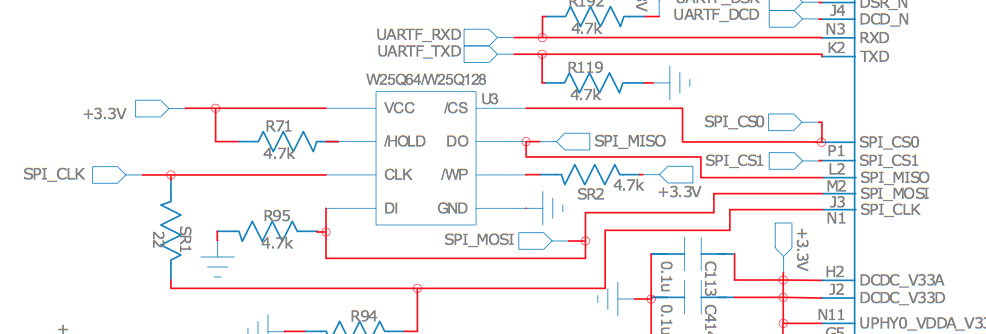
There are push to GND…
And compare my dock circuit, they are pull to VCC…
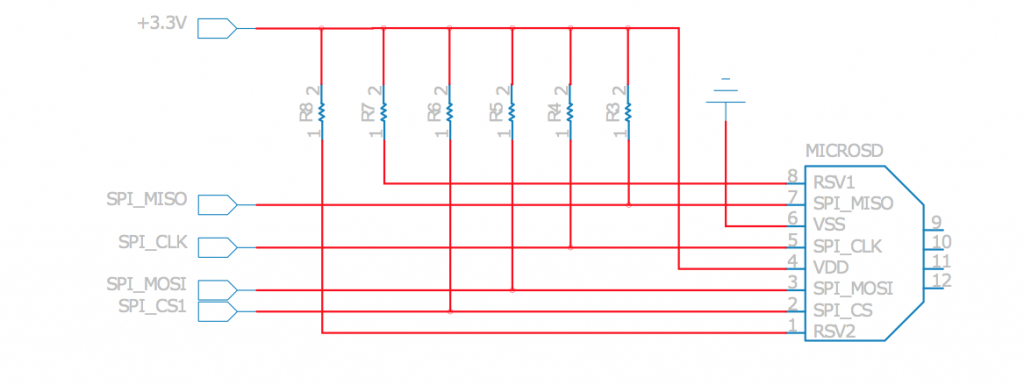
Ye, HERE IT IS, my dock is not compatible with that VoCore.
That might the possible reason why the TF card do not reply me. The circuit is like this now…That 20K ohm resistor is planed to pull SPI_MOSI to VCC but now weaken the signal, due to that 4.7k ohm push it to GND… 0.8V happens to at the edge of VIL(Input LOW Voltage) of microSD card.
VoCore v1.0 Dock SCH & Layout
There is no big issue for dock, this part is able to public now 🙂
R1, R2 is 300ohm, rest are all 20Kohm.(R4, R5 NC)
VoCore: SPI & MicroSD 5
I can not make SPI_CS1 work from register, also find the following small line from datasheet(page 87):

So does this mean CS should be only controlled by software but not that SPI_ENABLE register? SPI_ENABLE is just a switch? But how CS0 be controlled? :'( Ahhhh, this kills me, maybe only ralink developer knows how to use it…
I use spi_cs1 as GPIO(thanks to Noltari’s patch) and control it in spi-rt2880.c that driver. Finally, the spi cs1 works. 🙂 this is my spi-rt2880.c.
I read from oscilloscope there is some data send from MOSI to that TF card but TF card just no reply…
VoCore: SPI & MicroSD 4
🙂 So many mess things, delayed the SPI & MicroSD process.
I have tried many many ways recently, finally get some results, still need more check/read/fix etc…
First, I read all the code about SPI and MMC. Also the RT5350F datasheet, SPI part.
Then, I tried to modify that spi-rt2880.c to support SPI1. Thanks for that patch I mentioned in “VoCore: SPI & MicroSD 3” from John, that helps a lot. But no luck, that patch can not work.
I just think that might be register error, so I connected MISO/MOSI/CS0/CS1 to oscilloscope, and tried every compose of the control/config register.
After many many fails, I got a result, whatever I changed the register, the SPI_CS1 was keeping low. That is abnormal. So when I try to use mmc, I just get many “TX error = -145”, “RX error = -145″…
PS: some other interesting result:
1. I find TXFALLEDGE & RXFALLEDGE register can not be used same time during my test , from my understanding, that is used to control CPHA, should be used same time…weird, need more test.
2. Do not use uboot update the firmware if MicroSD is in the slot. That will cause CRC error once update done and you reboot it.
Then I try to use SPI_CS1 as GPIO, to check if that pin is able to change by code.
When I call “echo 27 > export”, just get such error “This device does not exist”.
I was thinking that must be taken by SPI driver, so just another try “echo 3 > export”(GPIO3 is one in using SPI pin), get a totally different result, system told me it is busy.
That should be driver problem now, and not spi-rt2880 driver problem, when I am reading/fixing the pinmux code. This topic(http://vonger.cn/?topic=rfc-openwrt-support) helps me. (My old plan is to change pinmux code, which is /linux/arch/mips/ralink/rt305x.c and add a new group spics1 to it)
And I find an issue in that rt5350.dtsi. My fix is here, rt5350.dtsi, VOCORE.dts
gpio0 is 24 pins but in datasheet that control should only able to control 22 pins. Even we can export 24 gpio from that control but GPIO#22, GPIO#23 can not be use at all.
gpio1 offset is @638, but in datasheet, no such control at all, it should be @660.
Now the GPIO is working.
RX = -145 and TX = -145 disappeared.
But I still get such error every 0.5 seconds. (I guess the driver is trying to detect that SD card, due to we do not have hardware card detect irq)
setup: request speed is too low 400000. can't not change chip-polarity
That is due to RT5350 min spi speed is 120MHz / 128 = about 1MHz, 400KHz is too low.
And after read the mmc code, that 400KHz is used to compatible the detect process with the old low speed SD card, so it is not that important. Just dirty fix spi-rt2880.c remove that error, and if we find the request spi speed is lower than 1MHz, focus to set it to 1MHz. 🙂 Then the kernel log is quiet.
Finally, another mmc kernel is keeping show itself every 5~30 seconds.
[ 353.260000] mmc0: error -22 whilst initialising SDIO card [ 353.270000] mmc0: host doesn't support card's voltages [ 353.280000] mmc0: error -22 whilst initialising SD card [ 353.300000] mmc0: host doesn't support card's voltages [ 353.310000] mmc0: error -22 whilst initialising MMC card
This is easy to remove. VoCore do not support modify SD voltage ranges, so remove the line in VOCORE.dts
voltage-ranges<3300 3300>;
When boot up, there is a warning for that, but no such noise kernel log anymore. 😀
[ 15.110000] mmc_spi spi32766.1: OF: voltage-ranges unspecified [ 15.120000] mmc_spi spi32766.1: ASSUMING 3.2-3.4 V slot power [ 15.180000] mmc_spi spi32766.1: SD/MMC host mmc0, no DMA, no WP, no poweroff
From the system log, spi-mmc should work(if my dirty fix works)
[ 0.000000] Linux version 3.10.36 (vonger@vongers-mbp.lan) (gcc version 4.8.3 (OpenWrt/Linaro GCC 4.8-2014.04 r41181) ) #33 Thu Jul 31 16:15:45 CST 2014 [ 0.000000] SoC Type: Ralink RT5350 id:1 rev:3 [ 0.000000] bootconsole [early0] enabled [ 0.000000] CPU revision is: 0001964c (MIPS 24KEc) [ 0.000000] MIPS: machine is VoCore [ 0.000000] Determined physical RAM map: [ 0.000000] memory: 02000000 @ 00000000 (usable) [ 0.000000] Initrd not found or empty - disabling initrd [ 0.000000] Zone ranges: [ 0.000000] Normal [mem 0x00000000-0x01ffffff] [ 0.000000] Movable zone start for each node [ 0.000000] Early memory node ranges [ 0.000000] node 0: [mem 0x00000000-0x01ffffff] [ 0.000000] Primary instruction cache 32kB, VIPT, 4-way, linesize 32 bytes. [ 0.000000] Primary data cache 16kB, 4-way, VIPT, no aliases, linesize 32 bytes [ 0.000000] Built 1 zonelists in Zone order, mobility grouping on. Total pages: 8128 [ 0.000000] Kernel command line: console=ttyS0,57600 rootfstype=squashfs,jffs2 [ 0.000000] PID hash table entries: 128 (order: -3, 512 bytes) [ 0.000000] Dentry cache hash table entries: 4096 (order: 2, 16384 bytes) [ 0.000000] Inode-cache hash table entries: 2048 (order: 1, 8192 bytes) [ 0.000000] Writing ErrCtl register=00019e38 [ 0.000000] Readback ErrCtl register=00019e38 [ 0.000000] Memory: 29352k/32768k available (2132k kernel code, 3416k reserved, 545k data, 200k init, 0k highmem) [ 0.000000] SLUB: HWalign=32, Order=0-3, MinObjects=0, CPUs=1, Nodes=1 [ 0.000000] NR_IRQS:256 [ 0.000000] CPU Clock: 360MHz [ 0.000000] Calibrating delay loop... 239.61 BogoMIPS (lpj=1198080) [ 0.070000] pid_max: default: 32768 minimum: 301 [ 0.070000] Mount-cache hash table entries: 512 [ 0.080000] pinctrl core: initialized pinctrl subsystem [ 0.090000] NET: Registered protocol family 16 [ 0.140000] bio: create slabat 0 [ 0.150000] rt2880_gpio 10000600.gpio: registering 22 gpios [ 0.160000] rt2880_gpio 10000600.gpio: registering 22 irq handlers [ 0.170000] rt2880_gpio 10000660.gpio: registering 6 gpios [ 0.180000] rt2880_gpio 10000660.gpio: registering 6 irq handlers [ 0.190000] Switching to clocksource MIPS [ 0.200000] NET: Registered protocol family 2 [ 0.210000] TCP established hash table entries: 512 (order: 0, 4096 bytes) [ 0.230000] TCP bind hash table entries: 512 (order: -1, 2048 bytes) [ 0.240000] TCP: Hash tables configured (established 512 bind 512) [ 0.250000] TCP: reno registered [ 0.260000] UDP hash table entries: 256 (order: 0, 4096 bytes) [ 0.270000] UDP-Lite hash table entries: 256 (order: 0, 4096 bytes) [ 0.280000] NET: Registered protocol family 1 [ 0.290000] rt-timer 10000100.timer: maximum frequncy is 7324Hz [ 0.340000] squashfs: version 4.0 (2009/01/31) Phillip Lougher [ 0.360000] jffs2: version 2.2 (NAND) (SUMMARY) (LZMA) (RTIME) (CMODE_PRIORITY) (c) 2001-2006 Red Hat, Inc. [ 0.380000] msgmni has been set to 57 [ 0.390000] io scheduler noop registered [ 0.390000] io scheduler deadline registered (default) [ 0.420000] gpio-export gpio-export.4: 19 gpio(s) exported [ 0.430000] Serial: 8250/16550 driver, 2 ports, IRQ sharing disabled [ 0.450000] 10000c00.uartlite: ttyS0 at MMIO 0x10000c00 (irq = 20) is a 16550A [ 0.470000] console [ttyS0] enabled, bootconsole disabled [ 0.470000] console [ttyS0] enabled, bootconsole disabled [ 0.500000] m25p80 spi32766.0: unique id: 21543693050863d1 [ 0.510000] m25p80 spi32766.0: w25q64 (8192 Kbytes) [ 0.520000] 4 ofpart partitions found on MTD device spi32766.0 [ 0.530000] Creating 4 MTD partitions on "spi32766.0": [ 0.540000] 0x000000000000-0x000000030000 : "uboot" [ 0.550000] 0x000000030000-0x000000040000 : "uboot-env" [ 0.570000] 0x000000040000-0x000000050000 : "factory" [ 0.580000] 0x000000050000-0x000000800000 : "firmware" [ 0.600000] 0x00000013fc33-0x000000800000 : "rootfs" [ 0.610000] mtd: partition "rootfs" must either start or end on erase block boundary or be smaller than an erase block -- forcing read-only [ 0.640000] mtd: device 4 (rootfs) set to be root filesystem [ 0.650000] mtd: partition "rootfs_data" created automatically, ofs=0x370000, len=0x490000 [ 0.660000] 0x000000370000-0x000000800000 : "rootfs_data" [ 0.690000] eth0: done loading [ 0.700000] rt3xxx-usbphy ubsphy.3: loaded [ 0.710000] rt2880_wdt 10000120.watchdog: Initialized [ 0.720000] TCP: cubic registered [ 0.730000] NET: Registered protocol family 17 [ 0.740000] 8021q: 802.1Q VLAN Support v1.8 [ 0.760000] VFS: Mounted root (squashfs filesystem) readonly on device 31:4. [ 0.780000] Freeing unused kernel memory: 200K (8029e000 - 802d0000) procd: Console is alive procd: - watchdog - [ 7.190000] usbcore: registered new interface driver usbfs [ 7.200000] usbcore: registered new interface driver hub [ 7.210000] usbcore: registered new device driver usb [ 7.240000] SCSI subsystem initialized [ 7.260000] ehci_hcd: USB 2.0 'Enhanced' Host Controller (EHCI) Driver [ 7.280000] ehci-platform: EHCI generic platform driver [ 7.490000] rt3xxx-usbphy ubsphy.3: remote usb device wakeup disabled [ 7.500000] rt3xxx-usbphy ubsphy.3: UTMI 16bit 30MHz [ 7.510000] ehci-platform 101c0000.ehci: EHCI Host Controller [ 7.520000] ehci-platform 101c0000.ehci: new USB bus registered, assigned bus number 1 [ 7.540000] ehci-platform 101c0000.ehci: irq 26, io mem 0x101c0000 [ 7.570000] ehci-platform 101c0000.ehci: USB 2.0 started, EHCI 1.00 [ 7.580000] hub 1-0:1.0: USB hub found [ 7.590000] hub 1-0:1.0: 1 port detected procd: - preinit - [ 8.830000] rt305x-esw 10110000.esw: link changed 0x00 Press the [f] key and hit [enter] to enter failsafe mode Press the [1], [2], [3] or [4] key and hit [enter] to select the debug level jffs2 is not ready - marker found procd: - early - procd: - watchdog - procd: - ubus - procd: - init - Please press Enter to activate this console. [ 14.620000] NET: Registered protocol family 10 [ 14.650000] nf_conntrack version 0.5.0 (461 buckets, 1844 max) [ 14.680000] ip6_tables: (C) 2000-2006 Netfilter Core Team [ 14.710000] Loading modules backported from Linux version master-2014-05-22-0-gf2032ea [ 14.730000] Backport generated by backports.git backports-20140320-37-g5c33da0 [ 14.750000] ip_tables: (C) 2000-2006 Netfilter Core Team [ 14.830000] xt_time: kernel timezone is -0000 [ 14.880000] cfg80211: Calling CRDA to update world regulatory domain [ 14.890000] cfg80211: World regulatory domain updated: [ 14.900000] cfg80211: DFS Master region: unset [ 14.910000] cfg80211: (start_freq - end_freq @ bandwidth), (max_antenna_gain, max_eirp), (dfs_cac_time) [ 14.930000] cfg80211: (2402000 KHz - 2472000 KHz @ 40000 KHz), (N/A, 2000 mBm), (N/A) [ 14.950000] cfg80211: (2457000 KHz - 2482000 KHz @ 40000 KHz), (N/A, 2000 mBm), (N/A) [ 14.960000] cfg80211: (2474000 KHz - 2494000 KHz @ 20000 KHz), (N/A, 2000 mBm), (N/A) [ 14.980000] cfg80211: (5170000 KHz - 5250000 KHz @ 80000 KHz), (N/A, 2000 mBm), (N/A) [ 15.000000] cfg80211: (5735000 KHz - 5835000 KHz @ 80000 KHz), (N/A, 2000 mBm), (N/A) [ 15.010000] cfg80211: (57240000 KHz - 63720000 KHz @ 2160000 KHz), (N/A, 0 mBm), (N/A) [ 15.110000] mmc_spi spi32766.1: OF: voltage-ranges unspecified [ 15.120000] mmc_spi spi32766.1: ASSUMING 3.2-3.4 V slot power [ 15.180000] mmc_spi spi32766.1: SD/MMC host mmc0, no DMA, no WP, no poweroff [ 15.210000] PPP generic driver version 2.4.2 [ 15.230000] NET: Registered protocol family 24 [ 15.290000] ieee80211 phy0: rt2x00_set_rt: Info - RT chipset 5350, rev 0500 detected [ 15.300000] ieee80211 phy0: rt2x00_set_rf: Info - RF chipset 5350 detected [ 27.060000] jffs2_scan_eraseblock(): End of filesystem marker found at 0x0 [ 27.090000] jffs2_build_filesystem(): unlocking the mtd device... done. [ 27.100000] jffs2_build_filesystem(): erasing all blocks after the end marker... [ 30.050000] device eth0.1 entered promiscuous mode [ 30.060000] device eth0 entered promiscuous mode [ 30.090000] br-lan: port 1(eth0.1) entered forwarding state [ 30.100000] br-lan: port 1(eth0.1) entered forwarding state [ 32.100000] br-lan: port 1(eth0.1) entered forwarding state
Will do test tomorrow 😀
Some necessary files: spi-rt2880.c (some code is from John’s patch)
About the forum on freshdesk.
Hi every reader,
Due to many people report me the forum server(freshdesk.com) is in their mail spam list, so they can not register or receive mail from it…
And another big issue is this freshdesk.com is not friendly at all. After the free trial over, they just close the forum(nobody is able to login) and do not give me even a minute to move the data or public a notify! I really hate that and do not trust them anymore.
Lucky me, there is not many topics yet, I have to move it back to vonger.cn, at least this is under my control. A new forum is here http://vonger.cn/?forum=vocore.
VoCore: SPI Flash Unique ID
SPI microSD is not done yet 🙂 Just finish an easy driver patch.
This patch is used to get unique id from flash chip. That id is also VoCore Unique ID(unless you change the flash chip). It will be used to get back factory setting(include mac address, wifi parameter, etc.) If you change the flash partition “factory”(512 bytes) and want to change it back. That factory setting can be downloaded from this site by this VoCore Unique ID.
Download new driver file m25p80.c
diff the origin m25p80.c and my m25p80.c
64,66d63
< /* Used for Winbond flashes only. */
< #define OPCODE_WINBOND_ID 0x4b /* Get flash unique id */
<
1001,1016d997
< /* flash unique id probe */
< static int unique_id_prob(struct spi_device *spi, u8 *id)
< {
< int tmp;
< u8 code[5];
<
< code[0] = OPCODE_WINBOND_ID;
< tmp = spi_write_then_read(spi, &code, 5, id, 8);
< if (tmp < 0) {
< pr_debug("%s: error %d reading UNIQUE ID\n",
< dev_name(&spi->dev), tmp);
< return tmp;
< }
< return 0;
< }
<
1125,1136d1105
< /* show unique id in kernel debug log for w25q64 or w25q128. */
< if(info->jedec_id == 0xef4017 || info->jedec_id == 0xef4018) {
< u8 unique_id[8];
< if(!unique_id_prob(spi, unique_id)) {
< dev_warn(&spi->dev, "flash id: %02x%02x%02x%02x%02x%02x%02x%02x\n",
< unique_id[7], unique_id[6], unique_id[5], unique_id[4],
< unique_id[3], unique_id[2], unique_id[1], unique_id[0]);
< } else {
< dev_warn(&spi->dev, "failed to get flash unique id.\n");
< }
< }
<
Part of bootup log:

This is tested by using winbond flash, but from read other chip datasheet, this is supported too.
Now the openwrt is compiled under mac 🙂 I do not have to use linux vm anymore. This makes the process a little faster. Thanks Markus Z for the tip, http://vocore.freshdesk.com/support/discussions/topics/1000033335
PS: there is a small bug in m25p80.c, jedec id of s25fl064k and w25q64 are same. w25q64(Winbond) jedec id is correct, so s25fl064k(Spansion) has a wrong id in the source. Is there anybody know its real jedec id? We should fix that little bug in linux kernel.
